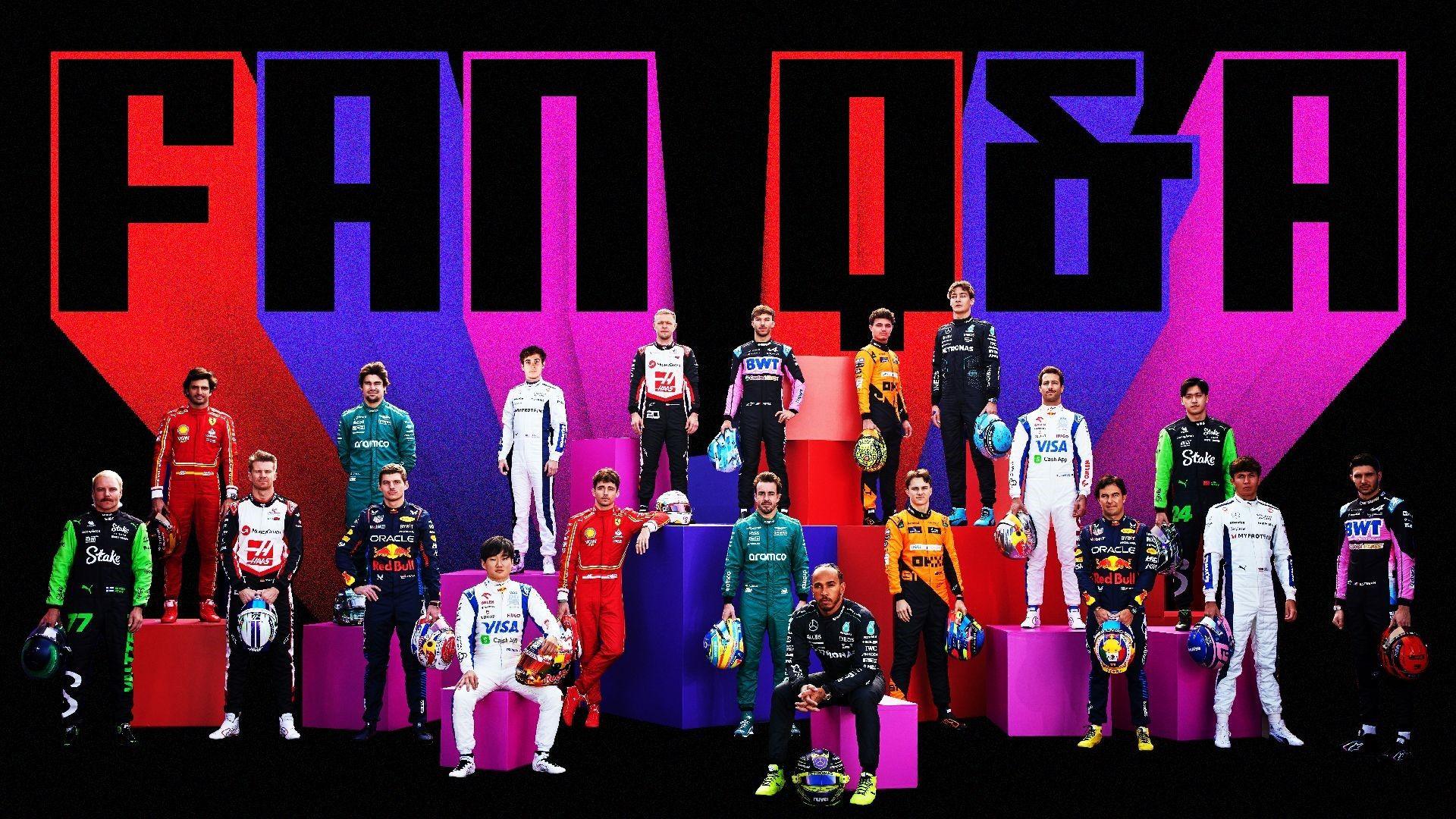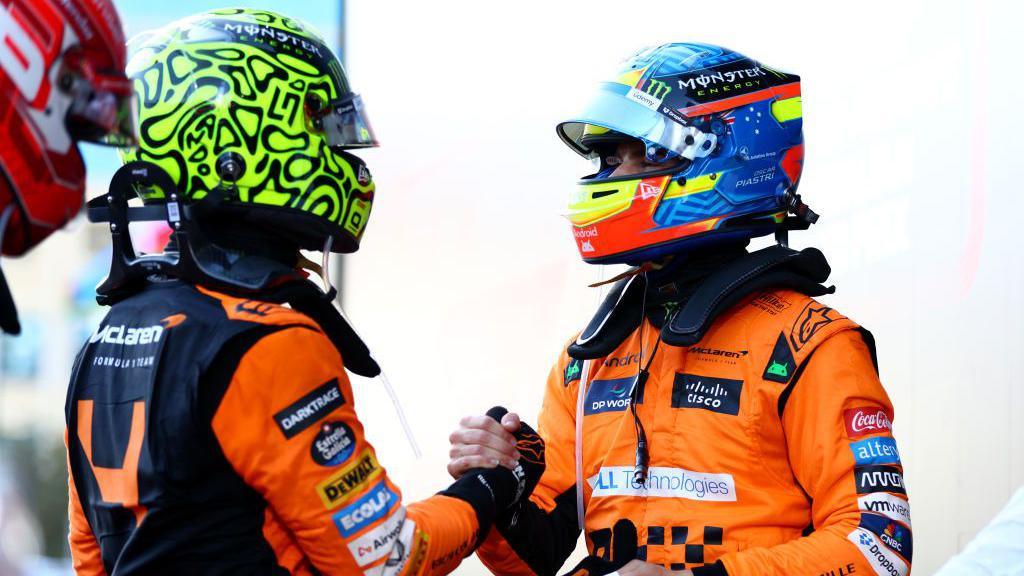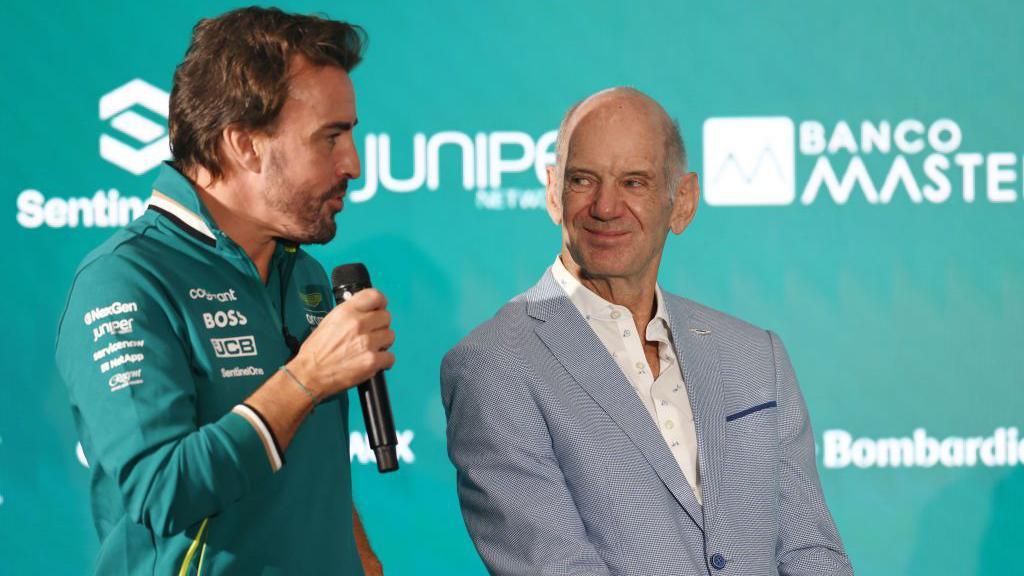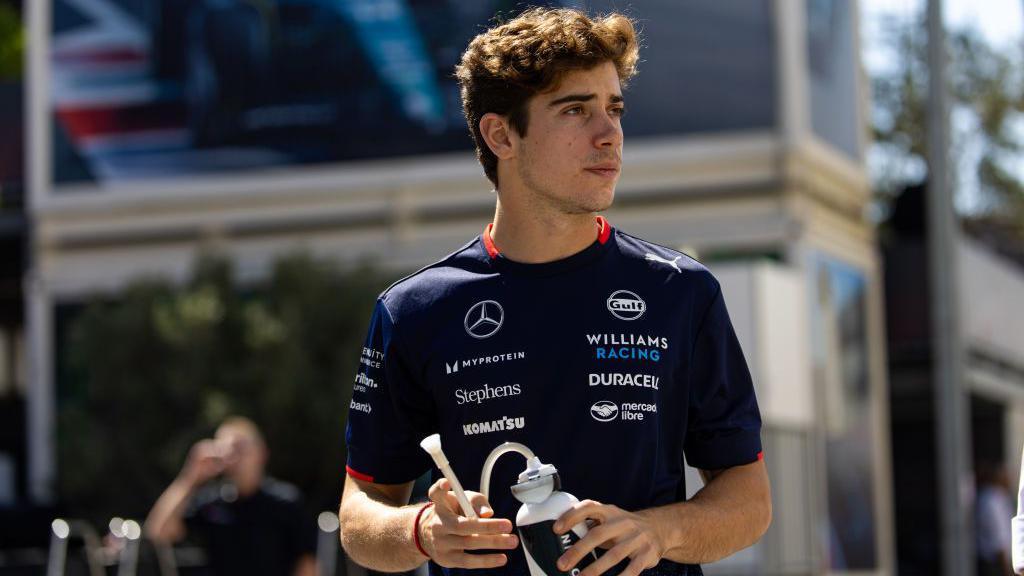F1 Q&A: Is this season Norris' best chance to win title?

- Published
McLaren's Oscar Piastri won his second race at the Azerbaijan Grand Prix after a gripping battle with Ferrari's Charles Leclerc.
With team-mate Lando Norris finishing fourth, McLaren have taken the lead in the constructors’ championship from Red Bull.
The race ended under a virtual safety car after a crash between Red Bull’s Sergio Perez and Ferrari’s Carlos Sainz.
BBC F1 correspondent Andrew Benson answers your questions after the race in Baku.
With Oscar Piastri looking like the faster driver, will this season be Lando Norris' best opportunity to be a world champion in a McLaren? – Vipul
There’s a lot to unpick in that question, and it seems to be based on some pretty questionable assumptions.
First of all, it’s not correct to say that Piastri is "the faster driver" at McLaren. In fact, Norris has had a slight edge on absolute pace this year.
In their qualifying head-to-head, Norris is leading 13-3, and is quicker by an average of 0.116 seconds. That’s counting races only where a fair comparison can be made, and not including wet sessions in the average speed calculation. The last time Piastri beat Norris in qualifying was in Monaco back in May.
And Norris is ahead of Piastri in the championship by 32 points.
Yes, Piastri has scored more points than any other driver in the past seven races - but that doesn’t necessarily mean he has been "faster" than Norris across them.
It’s actually surprisingly hard to tell which of the McLaren drivers has been quicker in most of those grands prix because there is a lot of circumstance involved in the races in which Piastri has finished ahead of Norris - Austria, Hungary, Belgium, Italy and Azerbaijan.
In Austria, Norris was well ahead but was hit by Max Verstappen as they battled for the lead and dropped back with a damaged car.
In Hungary, Norris qualified ahead in a McLaren one-two but was beaten off the line by Piastri. In the race, their pace looked pretty similar. Piastri edged away when he had the lead, Norris did the same when he did. As Piastri has said: "Clean air is king."
In Belgium, Norris made a mistake on the first lap and that allowed Piastri and others to get ahead. In Italy, Piastri overtook him on the first lap - and thereafter had clean air while Norris was behind Piastri and Charles Leclerc’s Ferrari, increasing his tyre wear. And in Baku, Norris was unlucky to come across a yellow flag in qualifying.
That’s not to make excuses for Norris. It’s just context that is important to bear in mind before forming conclusions about which driver is "faster".
On balance, a fair summary of the McLaren drivers’ seasons might be to say that they are closely matched, Norris has been slightly faster in qualifying, but that Piastri has been a more decisive and intuitive racer, and made fewer small errors.
Piastri is an outstanding talent, and his racecraft is among the best in the field. His overtaking moves to take the lead against Norris in Monza and Leclerc in Baku were absolutely superb.
McLaren Racing chief executive officer Zak Brown says he has the best driver line-up on the grid. It’s a subjective point - Lewis Hamilton and George Russell is quite the pairing, as will be Hamilton and Leclerc next year - but it’s certainly true that it is a fantastic combination.
Their competitiveness will doubtless cause McLaren some headaches, and it will mean both raise their game as they battle for internal supremacy.
But Norris is only 24, and he’s undoubtedly one of the elite. Piastri is rapidly establishing himself in the same bracket. This is Norris’ first chance of the title, but it surely won’t be his last.
Both Norris and Piastri look like future world champions, in fact. And the prospect of their competition as team-mates is mouth-watering. They both have many years of success ahead of them.

McLaren lead the constructors' championship, 20 points ahead of Red Bull
When was the last occasion a team such as Red Bull dominated the first half of a season only to fall away in such dramatic fashion? – David
Red Bull have indeed suffered a dramatic decline in competitiveness this season. From dominating the start of the year - four wins in the first five races, and seven in the first 10 for Max Verstappen, to now not winning for seven grands prix.
It is extremely unusual, but it is not unprecedented.
For example, in 2009, Jenson Button won six of the first seven races with Brawn, after which he had more than double the points of Red Bull’s Sebastian Vettel, who would emerge as Button’s closest title rival.
Button then did not win again all season, and the championship became a lot more tense and tight than it had looked like it would. In the end, Button won it with a race to spare with a great drive to fifth place in Brazil from 14th on the grid.
Before that, you have to go back to 1991, when Ayrton Senna won the first four races for McLaren while Williams struggled with reliability with their new FW14 - Adrian Newey’s first great car.
Senna then won only twice more before sealing the title in Japan with a race to go - after a mistake by Williams driver Nigel Mansell, who spun off on lap nine.
I can think of one more example - 1979, when Ligier dominated the first two races, Jacques Laffite winning both.
But then the team lost its way. It’s a fascinating story, including an anecdote about the team owner Guy Ligier deliberately smashing up the car’s sidepods because he wanted the team to build new ones to a different design. And it’s told brilliantly by my friend and colleague Mark Hughes in an article for Motor Sport magazine some time ago, external.
Other than that, there’s nothing obvious I can think of.
Will Ferrari catch Red Bull and is Leclerc also a title contender? – Felix
Max Verstappen said after both the Italian and Azerbaijan Grands Prix that he is not worried about the threat from Charles Leclerc in the drivers’ championship.
It’s not hard to see why - the Ferrari driver is 78 points behind Verstappen. He’d need to gain on him by more than 11 points a race on average over the remainder of the season, which does not seem likely.
Even Lando Norris’ target of just over eight points a race is tough enough.
The constructors’ championship is different, though. Red Bull lost the lead to McLaren in Azerbaijan on Sunday and don’t look like getting it back.
Ferrari are now only 31 points behind Red Bull and might well narrow that gap in Singapore this weekend - they won there last year, and Red Bull are not expecting a good weekend at Marina Bay.
But it remains to be seen how consistently competitive Ferrari will be over the final seven races - Leclerc is saying they have to wait until the US Grand Prix in Austin to get a definitive judgement because Monza, Baku and Singapore are ‘Ferrari circuits’, where they were also strong last year.
How can Aston Martin hire Adrian Newey, pay Fernando Alonso and open a new state-of-the-art wind tunnel if there is a budget cap in place? – John
The budget cap limits teams to spending £106m a year on their car design and build, salaries and operations. But a number of costs are excluded.
Among these are drivers, and the remuneration of the top-three highest-earning executives. So Alonso’s and Newey’s salaries are excluded from the cap.
As for the new factory and wind tunnel, there are also exceptions for capital expenditure.
It’s not a blanket exception - Williams team boss James Vowles was complaining last year, for example, that the allowance should be higher to allow his team to commit the investment in infrastructure they feel is required - and it has to be cleared with governing body the FIA.
Aston Martin have spent upwards of £200m on their new facilities, but it falls under that criteria.

Adrian Newey announced this month that he will join Aston Martin
Might Jamie Chadwick or another female driver get a drive in F1 soon? Must be better than some on the grid right now? – Ed
On the specific question of Jamie Chadwick, she is in the Williams F1 driver development programme, and is pursuing a career in IndyNXT in the US, Indycar’s equivalent of Formula 2. This year, she has won a race and finished seventh in the championship, which ended on Sunday in Nashville.
As for the wider question of when a female driver might reach F1, I would refer you to Susie Wolff, director of the F1 Academy, the entry-level series for aspiring female drivers.
Wolff told BBC Sport last year: "It’s going to take a long time."
The point of the F1 Academy is as a first step to help the most talented female drivers on to the feeder series ladder, and to attract more women into motorsport to increase the chances of someone making it longer term.
It's clear that among the obstacles to a woman making it to F1 is the lack of representation of women in motorsport, and the very low percentage of racing drivers who are female.
As Wolff puts it: "I am well aware we need to increase the talent pool for the best to rise up, and only then will we be able to open the door to F1."
The racing is so great now. Why can we not keep these regulations for longer? – PM
F1 is indeed in pretty good shape right now. These current regulations are far from perfect - the ground-effect cars are probably too stiff, they are too prone to 'bouncing', they have not improved overtaking anywhere near as much as was promised, and the Pirelli tyres are still too thermally sensitive, which harms the racing.
But the top four teams are very closely matched and the racing from event to event is very competitive.
F1 is committed to new rules being introduced in 2026 though, and there is no going back.
The new power-unit regulations - which increase the proportion of overall power provided by the hybrid part of the engine to about 50% and mandate fully sustainable fuels - were introduced to keep F1 relevant and attract new manufacturers. They succeeded in persuading Honda to stay and getting Audi and Ford to enter.
The cars are being changed, too - at least partly because of some of the points mentioned in the start of this answer.
Will this make the field less competitive? It’s quite possible. Quite often, when new rules are introduced, one team does start with an advantage. But it’s impossible to know right now. And in any case, everyone in F1 accepts that the rules need to be refreshed every few years.
Will Franco Colapinto’s impressive form earn him a drive with a team for next year? – Brendan
Franco Colapinto has indeed performed well in his two races since replacing Logan Sargeant at Williams, fully justifying the team’s decision to drop the American and promote the Argentine.
Colapinto finished eighth in Baku on Sunday in only his second race, and would have scored a point for 10th even without the crash between Carlos Sainz and Sergio Perez in the closing stages.
But there is no available seat at Williams in 2025 - they have already signed Alex Albon and Sainz.
In fact, there is only one seat still open to Colapinto on the grid, really, because although Red Bull have still not confirmed their line-up at RB, they will stick in-house.
That means only the second Sauber seat alongside Nico Hulkenberg is up for grabs in 2025. And Colapinto does not seem to be a frontrunner for that.
It appears at the moment as if it is between incumbent Valtteri Bottas and Formula 2 championship leader Gabriel Bortoleto, who is a protege of Fernando Alonso.
Bortoleto, a 19-year-old Brazilian, has had a very impressive campaign in F2 this year, including a superb win in the Monza feature race from the back of the grid.

Franco Colapinto replaced Logan Sargeant in the Italian Grand Prix at Monza
I often hear the phrase of putting a heat cycle through the tyres. Can you please explain the benefits of doing this? – Gordon
This is a reference to the so-called 'scrubbing' of tyres - when teams run the tyres for one slow lap before putting them aside for later usage.
It’s done to prepare them for use in the race. Teams always want brand new tyres for qualifying.
Some teams believe that 'scrubbing' tyres makes them more resilient and easier to handle in the race. McLaren and Aston Martin are two examples.
Often, for example, when you look at the list of tyres available for each driver for the race, it will appear as if they have fewer brand new tyres than other teams. Quite often, at least some of those 'used' tyres will merely be scrubbed.
But this is not an exact science. Even the engineers whose teams do it will tell you there is no absolute proof it makes the tyres better for the race. Many teams don’t believe it does and tend not to do it.